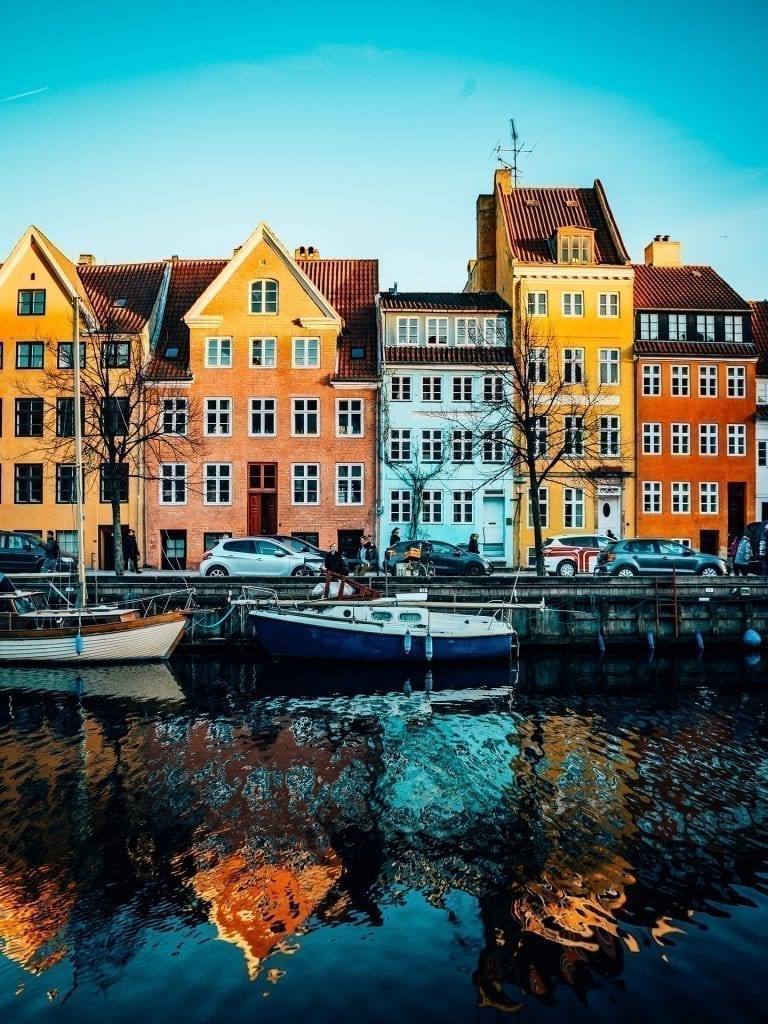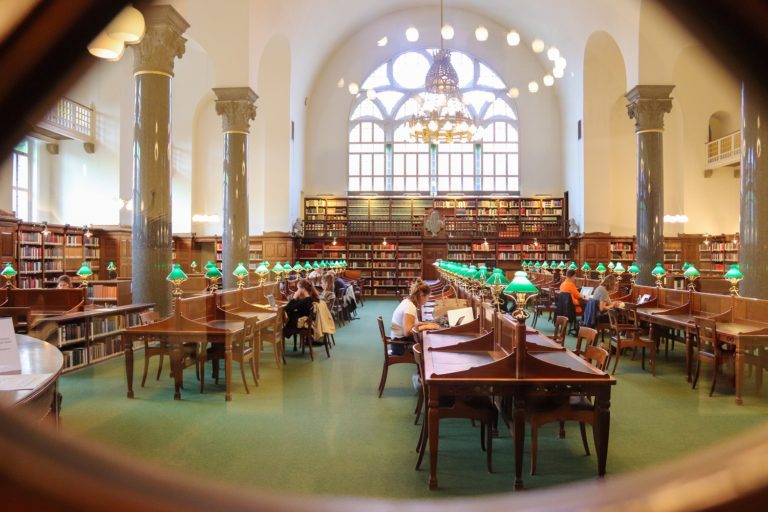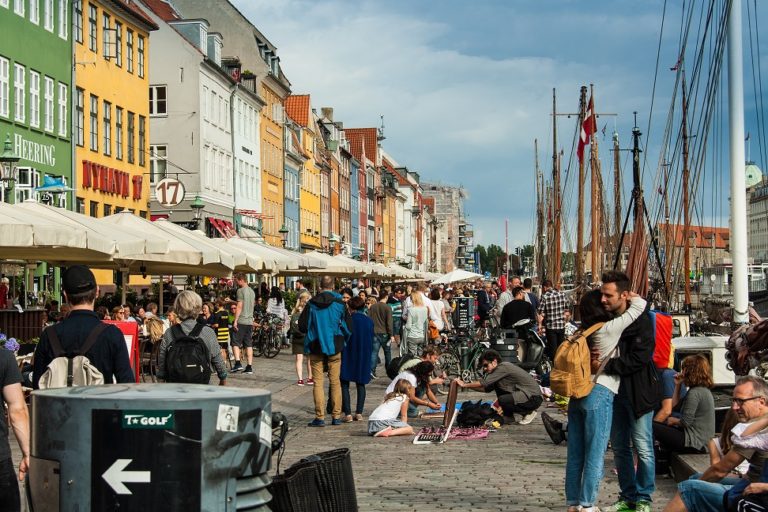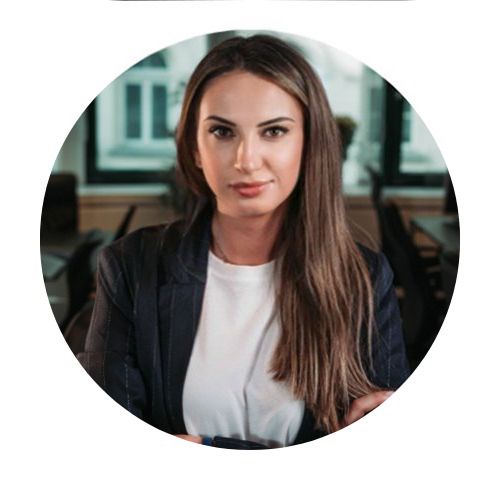Study in Denmark
Why study in Denmark
When you study in Denmark, you will be studying in a highly developed and affluent country with a liberal mindset, free healthcare, and a high standard of living. Danes are among the happiest people on the planet, according to researchers. If you are accepted at a Danish university, you will find modern facilities, rich resources, a collaborative approach to learning, and an emphasis on group and project work. The Danish literacy rate is extremely high at 99 percent, and the majority of Danes speak English. Denmark is the gateway to Europe and offers many historical and natural riches to enjoy when you are not studying.
Study in Denmark – developing skills
If you study in Denmark, you will develop a range of valuable, practical, and transferable skills. The Danish higher education system is built around group work, projects, lectures, and tutorials as well as enjoying close links with industry. These help to maximise the students practical experience through partnerships with other national institutions and promote foreign placements or internships.
While you study in Denmark, you will work in small groups and in a cooperative atmosphere. Lecturers are often addressed by their first names and are accessible to their students and supportive when it comes to dealing with academic and personal concerns. Denmark has an egalitarian philosophy, and this is reflected in its education system.


What do I need to know if I want to study in Denmark?


Study in Denmark – one of the best countries in Europe
If you are considering studying in Denmark, then you will benefit from Elab’s Europa program, which covers Europe’s best universities and enables participants to make the right, informed choices. In recent years Denmark has reduced the number of universities and options available to foreign students, however, Elab – through its network of partner universities -can help you find a suitable place.
Elab offers premium support for applications to Copenhagen Business School, Alborg, or Aarhus University. Call or drop us an email. We can set up a meeting with one of our specialist consultants, face to face or online, and go through what you are looking for and what Denmark can offer to suit your interests and future career plans.
Study in Denmark – courses
Denmark has a two-level approach to undergraduate studies. You begin by taking an AP (Academy Profession ) degree, which lasts for 2 to 2.5 years. This is the equivalent of 120/150 points on the ECTS scale. You then have two options for finishing the course: you can take a Top-Up course, to gain a Bachelor’s degree or you can go straight into employment. The Top-Up Bachelor normally lasts from 18 months to two years.
In addition, institutions also offer a wide range of single bachelor’s degrees in certain fields. Gaining a bachelor’s degree from a Danish university normally takes between 3 and 3.5 years, while a master’s course lasts from one to two years. For advice on which path to take when you study in Denmark, contact Elab and we will talk you through your options.
Study in Denmark in English
Yes, it is possible to study in Denmark in English. Danish universities teach a limited number of undergraduate courses in English, currently, around 70 in total, whereas if you study in Denmark at the Master’s level you will be able to choose from a far wider selection (approximately 400) of English-taught programs.
The Danish government offers international students free Danish lessons. It might be worth considering signing up for these since certain courses are hybrids, with teaching partly in Danish and partly in English -which would widen your choices considerably.
Study in Denmark – undergraduate courses in English
The following institutions offer bachelor’s courses taught in English:
- Aarhus Business Academy
- Danish National Academy of Music
- VIA University College
- University College of Northern Denmark
- University College, Absalon
- Danish School of Media and Journalism
- Dania Academy
- International Business Academy
- KEA- Copenhagen School of Design and Technology
- UCL University College
- University College, Copenhagen
- University College, South Denmark
Study in Denmark – most popular undergraduate courses
The following are among the most popular courses to study in Denmark in English at undergraduate level:
|
University in Denmark
|
Courses
|
|---|---|
|
University College, Southern Denmark
|
Mechatronics, European Studies, Electronics, Education, Engineering
|
|
Design School Kolding
|
Fashion Design, Communication Design, Textile Design,
|
|
International Business Academy
|
International Business
|
|
University College Northern Denmark
|
Web development, International Sales and Marketing
|
|
VIA University College
|
Architectural technology and construction management, Civil/ Mechanical/ Software technology Engineering
|
|
IT University Copenhagen
|
Global Business Informatics
|
Study in Denmark – studying for a Master’s degree
If you study in Denmark for a Master’s degree you will not have to pay tuition fees.
Courses last for two years and comprise three elements:
– mandatory units
– elective subjects
– and thematic studies
Your Master’s will require a thesis of original work, which will take you from six to nine months to complete. Master’s degrees offer the opportunity to choose specialised modules or a general syllabus.
Applications for a postgraduate place are processed by individual universities. Deadlines are commonly February-March. When it comes to language requirements to study in Denmark at the postgraduate level, you are expected to have CI knowledge of English and can submit IELTS as well as TOEFL certificates.
Where can I study Master’s Programmes in English in Denmark?
The following universities and higher education institutions offer excellent postgraduate courses, taught in English:
- Copenhagen Business School,
- Design School, Kolding,
- IT University of Copenhagen,
- Roskilde University,
- Technical University of Denmark,
- The Royal Academy of Music,
- University of Copenhagen,
- University of Southern Denmark.
Study in Denmark – most popular postgraduate coursesThere are well over 400 Master’s courses taught in English, with the following being highly rated:
- MBA
- MA Design
- MSc Biomedical Engineering
- Executive MBA
- Economics
- Civil Engineering
- Business Psychology
Study in Denmark – universities
Study in Denmark – types of higher education providers
When you study in Denmark you have a choice of different types of higher education institutions where you can study for a degree:
- Universities – there are eight universities in Denmark where you can get graduate and postgraduate qualifications. The University of Copenhagen is the first to have been established, back in 1479 and remained Denmark’s only university until 1928, when Aarhus University was founded.
- University colleges – offer professionally-oriented bachelor’s programs and diplomas but not postgraduate courses. Nursing, social work, teacher training, engineering and business are among the most popular subjects taught in these institutions.
- Business academies – there are nine business academies where you can do a two-year program.
- Institutions that specialise in architecture, the arts, music, film, and fine arts where you can gain a degree in these fields.
Study in Denmark Universities:
- Copenhagen Business School,
- Aarhus University,
- Roskilde University,
- University of Southern Denmark,
- IT University of Copenhagen,
- Aalborg University,
- University of Copenhagen,
- Technical University of Denmark
Study in Denmark – University Colleges:
- KEA, Copenhagen School of Design and Technology,
- Danish School of Media and Journalism,
- University College Absalom,
- University College Copenhagen,
- University College Lillebaelt,
- University College of Northern Denmark,
- VIA University College,
- University College of South Denmark.
Study in Denmark – Institutions of Art and Architecture:
- Royal Danish Academy of Fine Arts,
- Royal Danish Academy of Music,
- Royal Academy of Music,
- Aarhus School of Architecture,
- National Film School of Denmark,
- Design School, Kolding,
- Rhythmic Music Conservatory,
- Danish National Academy of Music,
- Danish National School of Performing Arts.
Study in Denmark – Business Academies:
- IBA International Business Academy,
- Business Academy Aarhus,
- Business Academy of Higher Education MidWest,
- Copenhagen Business Academy,
- Danish Academy of Business and Technology,
- EA Business Academy,
- Lillebaelt Academy,
- Zealand Institute of Business and Technology.
Study in Denmark – university rankings:
Although university rankings tend to be a guide to research output, you may want to consider the latest rankings when you are deciding where to study in Denmark.
University in Denmark | QS Ranking, 2022 | Times Higher Education Rankings 2022 |
University of Copenhagen | 79 | 96 |
Technical University of Denmark | 99 | 185 |
Aarhus University | 155 | 104 |
University of Southern Denmark | 309 | 251 |
Aalborg University | 326 | 201 |
Copenhagen Business School | 201 | |
Roskilde University | 601 |
Study in Denmark – requirements
There are three categories of requirements:
– general
– language
– course specific.
You may be asked for some or all of the following documents: a certificate of language proficiency, to sit an interview or submit a portfolio, to take a test, to submit a motivational letter, school grade scores/GPA.
At the Master’s level, you will also need to send in your original degree and may be asked for a CV or references, or work experience history.
Study in Denmark – applications
To apply to study in Denmark at the undergraduate level you will need to open an account on Denmark’s central application platform, Optagelse. This is the central admissions system, which opens on 1 February and closes on 15 March.
Any applications which fall outside these dates will not be considered by the Danish universities and you will have to wait a full year to submit your papers. You have to upload all the required documents to the system, and then print off the Signature Page ,which you sign, and send off to the university which you wish to attend.
To study in Denmark, you can apply to up to eight universities, and you do not need to pay a fee to do so, since the service is free.
List your choices in order of preference. However, bear in mind that if you apply for a number of courses at one university, you will have to download, fill in and return a Signature Page for each course. These cannot be uploaded but must be emailed or posted. KOT (Coordinated Admissions) will send on your offer, according to the order of preference you chose, by the end of July.
Elab can help you gather and prepare documents, and check and submit your application to study in Denmark.
Study in Denmark – the documents you need to apply through the application system
In order to apply to study in Denmark through the Danish application system, you will need to provide:
- your certificates,
- a chart of the hours you have studied specific subjects,
- the English language examination you have passed and the result or grade,
- and evidence of your identity or your passport.
Do not overlook the study hours requirement, since this is very important in the application process. Admissions boards want to see evidence that you have some school-based knowledge of the field you are asking to study.
Certain universities may also ask you to submit a Personal Statement, references, a CV and a Verification Form.
Once you have uploaded your documents you will need to print out the Signature Page – or pages – depending on how many courses you have applied to at a single university, since an electronic signature is not enough. Scan it and send it directly to the university. You should expect to receive a reply within six weeks.
Study in Demark – Letter of Motivation
To study in Denmark, you may be asked to upload a letter of motivation/personal statement along with your other documents and application form, although this is more commonly found at the Master’s level.
This is a formal document that should be written in plain, clear language. Describe why you believe that you are a good candidate for the course to which you are applying. You must demonstrate that you have read the university website and know all about the institution and the course. Set out your expectations, your academic background, your strengths and any experiences which are relevant.
Universities differ in word length demands, with 450-1000 being average. Some universities may also give you a few short essay questions to answer so they can discover more about your interest in the subject. These tend to be two or three paragraphs, of approximately 250 or so words.
Do not attempt to be humorous or flippant and try to avoid affectation, for example, by looking for clever quotes, etc. Most importantly, check your grammar and spelling. You need to make a good impression and badly paragraphed and misspelled sentences will not lead to success.
Elab has sent literally thousands of letters of motivation to universities abroad and our consultants are available, to give you advice, and ensure that you maximise your chances of being accepted to study in Denmark.
Study in Denmark – applying for a registration certificate
On arriving to study in Denmark you need to regularise your stay in Denmark. You are entitled to stay for three months before you need to secure a registration certificate.
The process is free, and it will take you seven days or so to get the certificate.
You can register and apply for the right of abode at the local town hall or city hall. If you are not sure where this is, ask the students’ union and someone will direct you to the right office.
What do you need for the registration certificate to complete your application to study in Denmark?
You will need to supply a number of documents when you go there, including:
- An acceptance letter from the academic institution where you will be studying
- ID, either a passport or a national ID card if you are an EU student
- Two photographs
- Two submission forms requesting the right of abode.
When your request has been processed and accepted, you will be allowed to stay in Denmark for three years. You will automatically be granted an extra six months when you have graduated, to enable you to look for a job.
Once you have had a positive response, you will be given a CPR number which you will need to find work, apply for a telephone number and mobile phone contract, to quote when you want to see a doctor or a dentist, to sign up for a free course in Danish or submit an application for a debit card.
Acceptance letter for studying in Denmark
The acceptance letter will also include an important yellow card, which you must put in a safe place. You will need to show it whenever you visit a doctor’s surgery and to access any type of medical service. Non-EU students are entitled to use emergency medical services, but in all other circumstances, they will have to rely on their health insurance policies to cover their costs.
Study in Denmark – Costs
Study in Denmark for free
If you want to study in Denmark be aware that Denmark is not the cheapest country in Europe. But the fact you will not have to pay tuition fees and can apply for government educational support – see below – makes it quite affordable for international students. You are also permitted to work, and this is useful for defraying some of your everyday living costs, although finding a job is to some degree dependent on where you decide to study in Denmark.
Study in Denmark – tuition fees
Denmark was ranked the fifth most expensive country in the world (2020), so it is fortunate that EU students do not have to pay tuition fees at university for their Bachelor and Master’s degrees.
Study in Denmark – the cost of living
When it comes to living costs, you will need to budget around 1,200 euros a month for accommodation, food, etc.
Most international students who study in Denmark buy bicycles in order to economise on travel costs, which are around 50-70 euros a month.
Copenhagen is, naturally enough, more expensive than other parts of the country, so you would be well advised to get an early application in for a place in a hall of residence if you want to attend university in the capital, since private accommodation can cost you up to 900 euros a month, whereas halls charge a far lower 250 or thereabouts.
The chart, below, will give you an idea of current prices for a range of items, in euros:
Meal for two at a mid-range restaurant | 80.66 | |
Fast food meal | 10.75 | |
Domestic Beer | 6.72 | |
Imported Beer | 6.05 | |
Cappuccino | 5.12 | |
Coke/Pepsi | 3.20 | |
Water | 2.62 | |
Milk | 1.41 | |
Loaf bread | 2.55 | |
1 kg rice | 2.07 | |
Dozen eggs | 3.59 | |
1 kg apples | 2.7 | |
1 kg chicken fillets | 9.10 | |
1 kg oranges | 2.73 | |
1 kg tomatoes | 3.50 | |
1 kg potatoes | 1.73 | |
Bottle of mid-range wine | 1.63 | |
Utilities, per month | 175 | |
Study in Denmark – financial help
As an EU student, you are entitled to apply for financial aid and will have exactly the same rights as Danish students under EU law if you meet two conditions: if you have lived in Denmark for five years, OR you have status as a worker.
The grant to apply for is the SU, see below.
Study in Denmark – applying for the SU
The SU, or the Danish State Educational Support scheme, is a social grant which is given to every student as long as they:
- have a CPR number which confirms their right of abode
- are following a course of studies
- are working legally for a minimum of 43 hours a month
- have a Danish bank account.
SU is, on average, around 5500 DKK, gross –i.e., before any deductions, which is loosely equivalent to 750 euros.
Once you have started working, apply to the SU office at your university, whose consultants will help you. A month after starting work, you will be given a certificate that confirms where you are working and the number of hours you are employed. Pass this on to your SU consultant, along with a copy of your employment contract. You should receive your first SU payment two months after you start your job.
Remember that you will not be in a position to take long summer breaks if you wish to retain your financial aid. However, the SU is a generous payment that will allow you to live comfortably when added to your working wage. As a result, you will not have to worry too much about money while studying in Denmark.
Study in Denmark – popular student cities
Perhaps surprisingly, Copenhagen is not ranked the most popular student city in Denmark. That honor goes to Aarhus, closely followed by Aalborg, with the capital coming in third place.
When you study in Denmark, you have a choice between small towns, where costs are some 20 percent lower than in Copenhagen, and as you can see from the student ratings, international students who study in Denmark have indeed opted for university towns.
Student Cities in Denmark – Study in Aarhus
Aarhus has a population of some 340,000. The capital of Jutland, its students make up 18 percent of the inhabitants and this means that it is an extremely lively, student-centered place to live. Trendy, young, and safe, it is ideal for sports enthusiasts and students who are looking for vibrant nightlife.


Student Cities in Denmark – Study in Aalborg
Aalborg has a population of approximately 280,000 and is commonly referred to as the Paris of the North, combining its status as a center of commerce and business, with its famous spirit of carnival and crisscrossed by a picturesque canal.


Student Cities in Denmark – Study in Copenhagen
Copenhagen, with a population of 910,000, is one of the safest cities on earth, and is renowned for its green credentials, having five bicycles for each car, a culture of fresh food, a famous annual jazz festival which draws thousands of people from across the world, and stunning botanical gardens to revise in.


Student Cities in Denmark – Study in Odense
Odense is a small town of 190,000, which offers a rich cultural life, a historic backdrop, a plethora of outdoor festivals, and a relaxed atmosphere.
Given these very different options, everyone who comes to study in Denmark will easily find their ideal location and environment. If you would like to discuss the various locations where you can study in Denmark, call us at Elab and we will give you comprehensive information.


Elab’s Five Steps to Success:
![5 steps to success Elab Education Laboratory [ENG]](https://elabedu.eu/wp-content/uploads/2022/06/english-5-steps-poster-03-1024x580.png)
![5 steps to success Elab Education Laboratory [ENG]](https://elabedu.eu/wp-content/uploads/2022/06/english-5-steps-poster-03-1024x580.png)
Step 1: Applicant Induction and Diagnostics
- Analysis of the client’s interests, aspirations and budgetary considerations
- Diagnostic test, questionnaire and consultation
Step 2: University Search and Generating Report
- Preliminary report on the chosen universities, in line with the client’s profile and personal preferences
- An evaluation of financial options and time constraints
Step 3: Planning How to Proceed and Preparatory Strategies
- Drawing up a detailed plan of the process and its various stages against a timeline
- Introducing tutors who will maximise the client’s chances of succeeding in their applications
- Determining the required entrance exams
Step 4: Preparing and Submitting the Final Application
- Preparing the final version of the application documents
- Submitting the application through the designated online platform or sending it directly to the chosen universities.
Step 5: University Offers and Making a Decision
- Final choice of university and course
- Interviews
- Submitting an application for financial support and
accommodation
Study abroad with Elab - reviews from our applicants:
Students who study abroad have very positive opinions of
the courses and life in general. Below are a few examples of opinions from Elabs student’s studying abroad or who recently completed their studies:


Start your Denmark Application
Contact Elab. We can help you prepare a professional application.
Upcoming Education Events to feed your brain.




